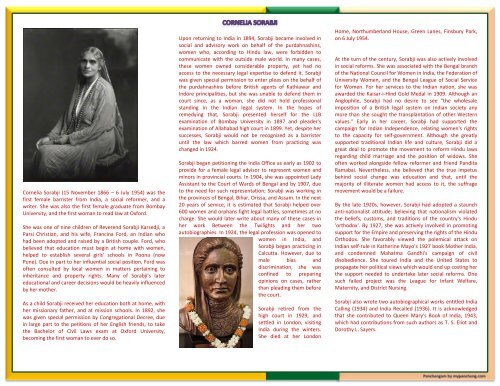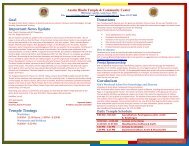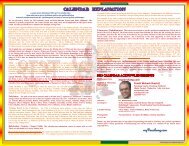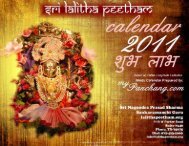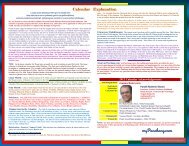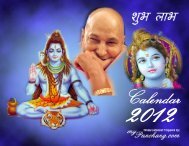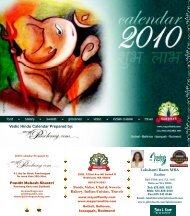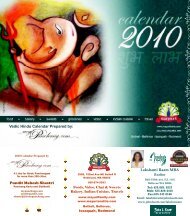Women's Education 2013 Hindu Calendar - myPanchang.com
Women's Education 2013 Hindu Calendar - myPanchang.com
Women's Education 2013 Hindu Calendar - myPanchang.com
- No tags were found...
Create successful ePaper yourself
Turn your PDF publications into a flip-book with our unique Google optimized e-Paper software.
Cornelia Sorabji (15 November 1866 – 6 July 1954) was thefirst female barrister from India, a social reformer, and awriter. She was also the first female graduate from BombayUniversity, and the first woman to read law at Oxford.She was one of nine children of Reverend Sorabji Karsedji, aParsi Christian, and his wife, Francina Ford, an Indian whohad been adopted and raised by a British couple. Ford, whobelieved that education must begin at home with women,helped to establish several girls' schools in Poona (nowPune). Due in part to her influential social position, Ford wasoften consulted by local women in matters pertaining toinheritance and property rights. Many of Sorabji's latereducational and career decisions would be heavily influencedby her mother.As a child Sorabji received her education both at home, withher missionary father, and at mission schools. In 1892, shewas given special permission by Congregational Decree, duein large part to the petitions of her English friends, to takethe Bachelor of Civil Laws exam at Oxford University,be<strong>com</strong>ing the first woman to ever do so.Upon returning to India in 1894, Sorabji became involved insocial and advisory work on behalf of the purdahnashins,women who, according to <strong>Hindu</strong> law, were forbidden to<strong>com</strong>municate with the outside male world. In many cases,these women owned considerable property, yet had noaccess to the necessary legal expertise to defend it. Sorabjiwas given special permission to enter pleas on the behalf ofthe purdahnashins before British agents of Kathiawar andIndore principalities, but she was unable to defend them incourt since, as a woman, she did not hold professionalstanding in the Indian legal system. In the hopes ofremedying that, Sorabji presented herself for the LLBexamination of Bombay University in 1897 and pleader'sexamination of Allahabad high court in 1899. Yet, despite hersuccesses, Sorabji would not be recognized as a barristeruntil the law which barred women from practicing waschanged in 1924.Sorabji began petitioning the India Office as early as 1902 toprovide for a female legal advisor to represent women andminors in provincial courts. In 1904, she was appointed LadyAssistant to the Court of Wards of Bengal and by 1907, dueto the need for such representation; Sorabji was working inthe provinces of Bengal, Bihar, Orissa, and Assam. In the next20 years of service, it is estimated that Sorabji helped over600 women and orphans fight legal battles, sometimes at nocharge. She would later write about many of these cases inher work Between the Twilights and her twoautobiographies. In 1924, the legal profession was opened towomen in India, andSorabji began practicing inCalcutta. However, due tomale bias anddiscrimination, she wasconfined to preparingopinions on cases, ratherthan pleading them beforethe court.Sorabji retired from thehigh court in 1929, andsettled in London, visitingIndia during the winters.She died at her LondonHome, Northumberland House, Green Lanes, Finsbury Park,on 6 July 1954.At the turn of the century, Sorabji was also actively involvedin social reforms. She was associated with the Bengal branchof the National Council for Women in India, the Federation ofUniversity Women, and the Bengal League of Social Servicefor Women. For her services to the Indian nation, she wasawarded the Kaisar-i-Hind Gold Medal in 1909. Although anAnglophile, Sorabji had no desire to see "the wholesaleimposition of a British legal system on Indian society anymore than she sought the transplantation of other Westernvalues." Early in her career, Sorabji had supported thecampaign for Indian Independence, relating women's rightsto the capacity for self-government. Although she greatlysupported traditional Indian life and culture, Sorabji did agreat deal to promote the movement to reform <strong>Hindu</strong> lawsregarding child marriage and the position of widows. Sheoften worked alongside fellow reformer and friend PanditaRamabai. Nevertheless, she believed that the true impetusbehind social change was education and that, until themajority of illiterate women had access to it, the suffragemovement would be a failure.By the late 1920s, however, Sorabji had adopted a staunchanti-nationalist attitude; believing that nationalism violatedthe beliefs, customs, and traditions of the country's <strong>Hindu</strong>'orthodox'. By 1927, she was actively involved in promotingsupport for the Empire and preserving the rights of the <strong>Hindu</strong>Orthodox. She favorably viewed the polemical attack onIndian self-rule in Katherine Mayo's 1927 book Mother India,and condemned Mahatma Gandhi's campaign of civildisobedience. She toured India and the United States topropagate her political views which would end up costing herthe support needed to undertake later social reforms. Onesuch failed project was the League for Infant Welfare,Maternity, and District Nursing.Sorabji also wrote two autobiographical works entitled IndiaCalling (1934) and India Recalled (1936). It is acknowledgedthat she contributed to Queen Mary's Book of India, 1943,which had contributions from such authors as T. S. Eliot andDorothy L. Sayers.


